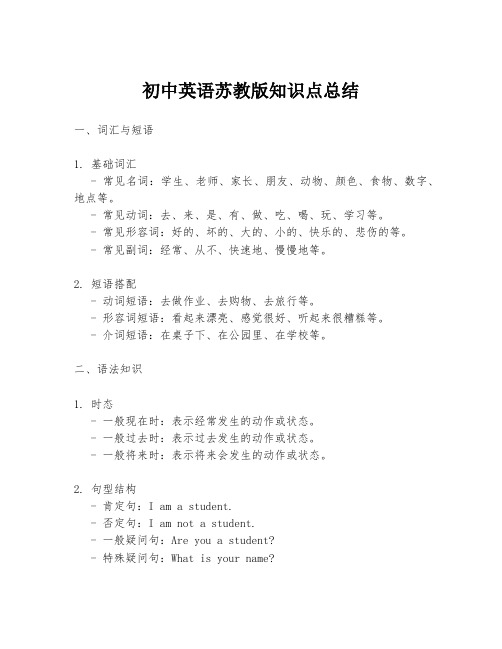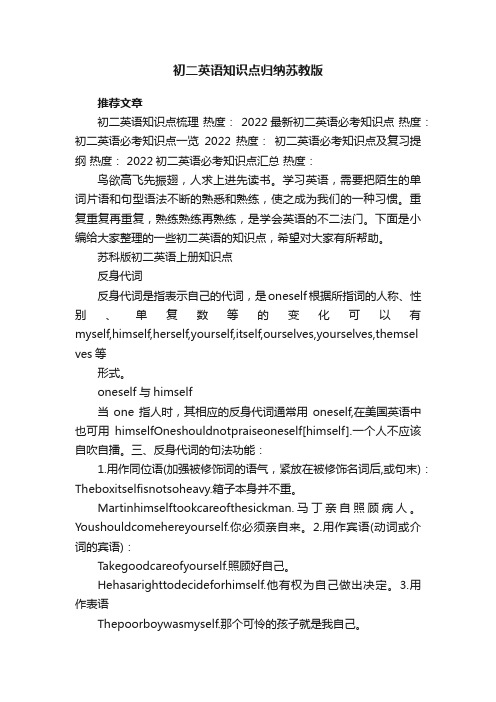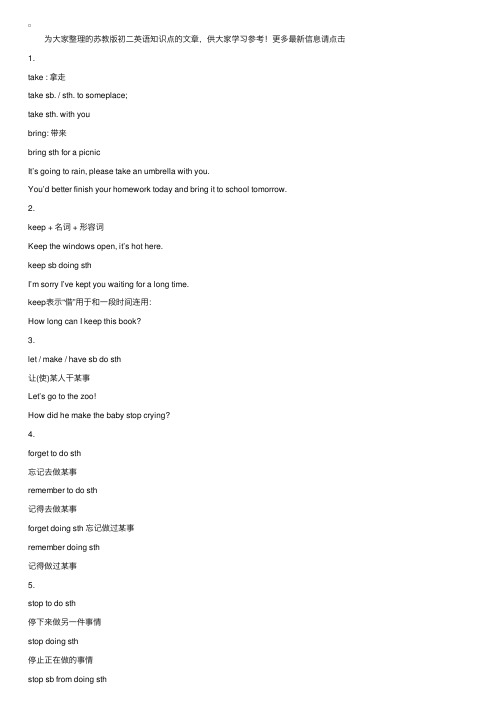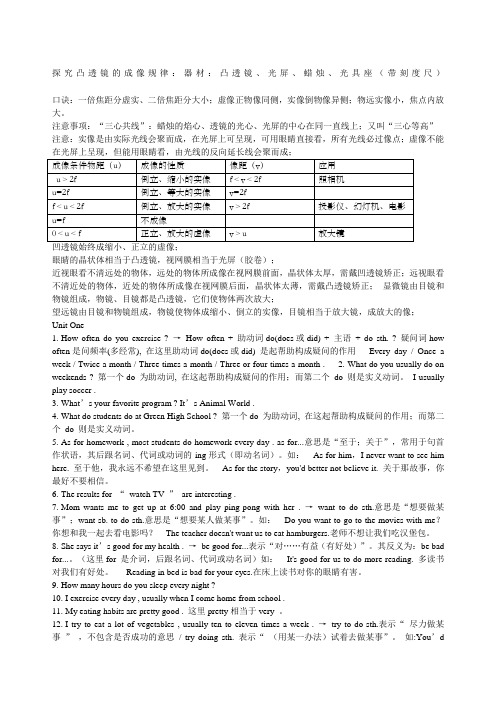苏教版初二英语知识要点
初中英语苏教版知识点总结

初中英语苏教版知识点总结一、词汇与短语1. 基础词汇- 常见名词:学生、老师、家长、朋友、动物、颜色、食物、数字、地点等。
- 常见动词:去、来、是、有、做、吃、喝、玩、学习等。
- 常见形容词:好的、坏的、大的、小的、快乐的、悲伤的等。
- 常见副词:经常、从不、快速地、慢慢地等。
2. 短语搭配- 动词短语:去做作业、去购物、去旅行等。
- 形容词短语:看起来漂亮、感觉很好、听起来很糟糕等。
- 介词短语:在桌子下、在公园里、在学校等。
二、语法知识1. 时态- 一般现在时:表示经常发生的动作或状态。
- 一般过去时:表示过去发生的动作或状态。
- 一般将来时:表示将来会发生的动作或状态。
2. 句型结构- 肯定句:I am a student.- 否定句:I am not a student.- 一般疑问句:Are you a student?- 特殊疑问句:What is your name?3. 代词- 人称代词:I, you, he, she, it, we, they.- 物主代词:my, your, his, her, its, our, their.- 反身代词:myself, yourself, himself, herself, itself, ourselves, yourselves, themselves.4. 冠词- 不定冠词:a, an.- 定冠词:the.5. 介词- 表示时间:at, on, in.- 表示地点:at, on, in, under, above, behind.- 表示方向:to, towards, through.6. 连词- 并列连词:and, but, or, so.- 从属连词:because, since, although, if, when, while.三、阅读理解1. 文章类型- 记叙文:讲述人物、事件的故事。
- 说明文:解释事物的特性、原因、过程等。
初二英语知识点归纳苏教版

初二英语知识点归纳苏教版推荐文章初二英语知识点梳理热度: 2022最新初二英语必考知识点热度:初二英语必考知识点一览2022 热度:初二英语必考知识点及复习提纲热度: 2022初二英语必考知识点汇总热度:鸟欲高飞先振翅,人求上进先读书。
学习英语,需要把陌生的单词片语和句型语法不断的熟悉和熟练,使之成为我们的一种习惯。
重复重复再重复,熟练熟练再熟练,是学会英语的不二法门。
下面是小编给大家整理的一些初二英语的知识点,希望对大家有所帮助。
苏科版初二英语上册知识点反身代词反身代词是指表示自己的代词,是oneself根据所指词的人称、性别、单复数等的变化可以有myself,himself,herself,yourself,itself,ourselves,yourselves,themsel ves等形式。
oneself与himself当one指人时,其相应的反身代词通常用oneself,在美国英语中也可用himselfOneshouldnotpraiseoneself[himself].一个人不应该自吹自擂。
三、反身代词的句法功能:1.用作同位语(加强被修饰词的语气,紧放在被修饰名词后,或句末):Theboxitselfisnotsoheavy.箱子本身并不重。
Martinhimselftookcareofthesickman.马丁亲自照顾病人。
Youshouldcomehereyourself.你必须亲自来。
2.用作宾语(动词或介词的宾语):Takegoodcareofyourself.照顾好自己。
Hehasarighttodecideforhimself.他有权为自己做出决定。
3.用作表语Thepoorboywasmyself.那个可怜的孩子就是我自己。
Theoneswhoreallywantitareourselves.真正想要它的是我们自己。
【说明】有时用于be,feel,seem,look等后作表语表示身体或精神处于正常状态:I’mnotquitemyselfthesedays.我近来身体不大舒服。
苏教版初二英语知识点

为⼤家整理的苏教版初⼆英语知识点的⽂章,供⼤家学习参考!更多最新信息请点击1.take : 拿⾛take sb. / sth. to someplace;take sth. with youbring: 带来bring sth for a picnicIt’s going to rain, please take an umbrella with you.You’d better finish your homework today and bring it to school tomorrow.2.keep + 名词 + 形容词Keep the windows open, it’s hot here.keep sb doing sthI’m sorry I’ve kept you waiting for a long time.keep表⽰“借”⽤于和⼀段时间连⽤:How long can I keep this book?3.let / make / have sb do sth让(使)某⼈⼲某事Let’s go to the zoo!How did he make the baby stop crying?4.forget to do sth忘记去做某事remember to do sth记得去做某事forget doing sth 忘记做过某事remember doing sth记得做过某事5.stop to do sth停下来做另⼀件事情stop doing sth停⽌正在做的事情stop sb from doing sth阻⽌某⼈⼲某事Let’s stop to have a test, it’s too hot today.When the teacher came into the classroom, the students stopped talking. We plant trees to stop the wind from blowing the earth away.begin / startto do sth6.tell / ask sb to do sth否定形式 tell / ask sb not to do sth.Policemen asked us not to play on the road , it was too dangerous.Our P.E. teacher told us a storyyesterday.7.see / hear / watch sb do sthsee/ hear /watch sb doing sthI heard him singing in the room when I passed by.8.enjoy sth ; enjoy doing sth ;enjoy oneself = have a good timeOur classmates went to the zoo last Sunday. They enjoyed themselves. 9.be busy with sth;be busy doing sthThey are all busy with their work.10.finish doing sth.Tom didn’t go to bed until he finished writing the composition.11.wantsth/to do sth/sb to do sthwould likesth/to do sth/sb to do sthfeel like doing sth.He didn’t feel like eating anything.12.had better do sth否定形式:had better not do sthYou’d better not sing here, the baby is asleep.13.Why not do sth ?=why don’t you do sth ?=Why didn’t you do sth ?Why not come with me?14.What about sth/what about doing sth ?=How about -----?How about playing basketball with us?15.Thank you for sth /Thanks for doing sth.Thanks for your help.------------It’s a pleasure.Thanks very much for helping me.16.instead往往放在句⾸或句尾instead of sth/instead of doing sth.通常放中间He didn’t go to the park. He went to the cinema instead. He went to the cinema instead of going to the park..。
初中英语知识点总结归纳苏教版

初中英语知识点总结归纳苏教版一、词汇与短语1. 基础词汇- 常见名词:家庭成员、学校科目、日常用品、颜色、数字、天气等。
- 动词:基本动作、感官动词、情态动词等。
- 形容词:描述人物特征、物品属性、情感状态等。
- 副词:频率副词、程度副词、时间地点副词等。
2. 短语搭配- 动词短语:look at, listen to, help with等。
- 介词短语:in the morning, on the desk, by the way等。
- 常见句型:be good at, have to, would like to等。
二、语法结构1. 时态- 一般现在时:表示经常发生的动作或状态。
- 一般过去时:表示过去某一确定时间发生的动作。
- 现在进行时:表示正在进行的动作或状态。
- 过去进行时:表示过去某一时刻正在进行的动作。
2. 语态- 被动语态:表示主语是动作的承受者。
- 一般现在时被动语态:am/is/are + past participle。
- 一般过去时被动语态:was/were + past participle。
3. 非谓语动词- 动名词:作为名词使用,表示动作,如swimming, reading。
- 分词:现在分词和过去分词,用作形容词或副词。
- 动词不定式:to + base form of verb,用作主语、宾语、表语等。
4. 代词- 人称代词:主格和宾格。
- 物主代词:形容词性物主代词和名词性物主代词。
- 反身代词、指示代词、疑问代词等。
5. 介词- 表示时间、地点、方向、原因、方式等。
- 常见介词:at, in, on, for, with, by, to, from等。
6. 连词- 并列连词:and, but, or, so等,连接并列句。
- 从属连词:because, since, although, if, when等,引导从句。
7. 句子结构- 简单句:一个主语和一个谓语构成的句子。
苏教版八年级上册英语知识点汇总

苏教版八年级上册英语知识点汇总一、词汇与短语1.高级词汇扩展:在七年级基础上,进一步学习并掌握更多高级词汇,涵盖更广泛的主题,如自然环境、科技、文学、历史、社会现象等。
2.短语与固定搭配:积累并熟练运用常用的短语、固定搭配和习惯用语,以增强语言表达的准确性和地道性。
二、语法知识1.时态深化:o一般过去时与现在完成时的对比:深入理解两种时态的区别,学会在适当语境中使用。
o过去进行时:学习并掌握过去进行时的用法,描述过去某个时间点正在进行的动作。
o将来时态:复习一般将来时,并引入新的将来时态表达法,如be going to, will等。
2.被动语态:学习并掌握一般现在时、一般过去时、一般将来时的被动语态,理解其用法和构成。
3.条件句:引入条件句的概念,学习零条件句(if...will...)、第一条件句(if...do...will...do...)的基本用法。
4.从句:初步接触并学习宾语从句、状语从句(如时间状语从句、原因状语从句)的用法和构成。
5.非谓语动词:了解动名词、不定式和分词(现在分词、过去分词)的基本概念和用法。
三、听力与口语1.听力技能提升:通过多样化的听力材料(如对话、短文、新闻、讲座等),提高学生的听力理解能力,包括捕捉关键信息、理解隐含意义等。
2.口语表达:加强口语训练,通过角色扮演、小组讨论、辩论等形式,提高学生的口语表达能力和交际技巧。
3.发音与语调:继续注重发音的准确性和语调的自然性,通过模仿、跟读等方式,提高学生的语音语调水平。
四、阅读与写作1.阅读技巧:培养学生快速阅读、仔细阅读、批判性阅读等多种阅读技能,通过阅读不同体裁的文章(如记叙文、说明文、议论文等),提高阅读理解能力。
2.阅读策略:引导学生学会预测、概括、推断等阅读策略,提高阅读效率和深度。
3.写作技巧:学习并掌握不同文体的写作技巧(如书信、日记、议论文等),通过写作练习,提高学生的写作能力。
4.写作过程:引导学生经历构思、起草、修改、校对等写作过程,培养良好的写作习惯。
初二苏教版英语知识点总汇

探究凸透镜的成像规律:器材:凸透镜、光屏、蜡烛、光具座(带刻度尺)口诀:一倍焦距分虚实、二倍焦距分大小;虚像正物像同侧,实像倒物像异侧;物远实像小,焦点内放大。
注意事项:“三心共线”:蜡烛的焰心、透镜的光心、光屏的中心在同一直线上;又叫“三心等高”注意:实像是由实际光线会聚而成,在光屏上可呈现,可用眼睛直接看,所有光线必过像点;虚像不能在光屏上呈现,但能用眼睛看,由光线的反向延长线会聚而成;眼睛的晶状体相当于凸透镜,视网膜相当于光屏(胶卷);近视眼看不清远处的物体,远处的物体所成像在视网膜前面,晶状体太厚,需戴凹透镜矫正;远视眼看不清近处的物体,近处的物体所成像在视网膜后面,晶状体太薄,需戴凸透镜矫正;显微镜由目镜和物镜组成,物镜、目镜都是凸透镜,它们使物体两次放大;望远镜由目镜和物镜组成,物镜使物体成缩小、倒立的实像,目镜相当于放大镜,成放大的像;Unit One1.How often do you exercise ? →How often + 助动词do(does或did) + 主语+ do sth. ? 疑问词how often是问频率(多经常), 在这里助动词do(does或did) 是起帮助构成疑问的作用Every day / Once a week / Twice a month / Three times a month / Three or four times a month .2. What do you usually do on weekends ? 第一个do 为助动词, 在这起帮助构成疑问的作用;而第二个do 则是实义动词。
I usually play soccer .3.What’s your favorite program ? It’s Animal World .4.What do students do at Green High School ? 第一个do 为助动词, 在这起帮助构成疑问的作用;而第二个do 则是实义动词。
苏教版初二英语Unit1知识概要

苏教版初二英语Unit1知识概要八上Unit1一、重要单词用法名词:secret 秘密magazine杂志lie 谎言joke 玩笑voice 嗓音singer 歌手sense 感觉,观念,意识height 高度weight 重量competition 竞赛,比赛,竞争test 测试swimmer 游泳者plan 计划动词:care关注,关心,在意make 成为,适合trust信任fit 可容纳,装进knock 碰,撞:把…撞击成choose 选择,挑选形容词:thirsty 口渴的honest 诚实的;正直的good-looking 好看的tidy 整洁的polite礼貌的true确实的,的确generous大方的round圆形的bored无聊的straight笔直的sweet可爱的,惹人怜爱的worst(bad的最高级)最差,最糟social社会的humorous幽默的shy害羞的square方形的smiling微笑的,带着笑意的handsome英俊的fat 胖的hard-working勤奋的,工作努力的patient耐心的unhappy不快乐的excellent杰出的,极好的副词:almost几乎,差不多代词:yourself你自己缩写词:sec. (=second)秒兼类词:smile vi. &n. 微笑二、常见词组1.have something to drink 喝点什么东西2.keep a secret 保守秘密3.make sb. happy使某人快乐4.share one’s joy 分享某人的快乐5.care about 关心,关怀6.be ready to 乐意7.tell lies说谎8.tell funny jokes 讲有趣的笑话9.one of………中的一个10.b e willing to do sth. 愿意做某事11.s haresth. with sb. 和某人分享某物12.g ive one’s seat to sb. 给某人让座13.i n need 需要14.g row up 长大;成年15.m ake sb. look smart/laugh 使某人看上去聪明/使某人笑16.h ave a good sense of humour富有幽默感17.s ay a bad word about sb. 说某人的坏话18.b e kind to sb. 对……和善19.i n the future 在将来20.c hoose sb. as…选某人当……21.o f the six students 在六个学生中22.d rawing competition 绘画竞赛23.t ravel around the world 环游世界24.b oth.. and…两个都;既……又……25.b e good at doing sth. / do well in doing sth. 擅长做某事三、经典句型1.You can trust them because they never tell lies.你能信任他们因为他们从不说谎。
苏教版初二英语Unit8知识概要

八上Unit8一、重要单词1.名词:earthquake地震coach长途汽车flood洪水,水灾village村庄,乡村lightning闪电storm风暴;暴风雨thunder雷;雷声shake摇动;震动fear害怕,恐惧direction方向shaking 摇动,震动heart心脏mind头脑dark黑暗shout呼喊,喊叫声rule规则railway铁路burn烧伤;烫伤;灼伤daughter 女儿granddaughter(外)孙女son儿子grandson(外)孙子board木板weekday工作日headache头痛toothache牙痛countryside乡下,农村housework家务活pancake烙饼;薄饼2.动词:shake摇动,震动beat(使)规律作响,作节奏运动break损坏;打破clear清除;清理3.形容词:loud响亮的;大声的;喧闹的silent寂静的nervous紧张不安的alive活着的safe安全的asleep睡着的4.副词:up完全地still仍然nearly几乎,将近behind在后面5.连词:while当……的时候,和……同时if是否since由于,既然after在……以后二、常见词组1.wake up醒来2.mop…up把……拖干净3.thousands of成千上万的4.wash away冲走5.catch fire着火6.at first起初7.in fear处于恐惧中8.run out of从……里跑出来9.try one’s best to do sth.尽力做某事10.r un in all directions四处逃散11.f all down落下12.n ot…at all一点也不13.s ay to oneself自言自语14.c alm down平静下来15.g o through one’s mind掠过某人的脑海16.s hout for help大声呼救17.f ind one’s way out找到出路18.m ove away搬走,移开19.a t last最后,终于20.u p and down上上下下21.b reak down损坏,出毛病22.a s…as possible尽可能……23.s tay away from远离……24.c oversth. with sth.用某物将某物覆盖25.s haresth. with sb.与某人分享某物26.k eep doing sth.一直做某事27.f all over摔倒三、经典句型1.I was sleeping when the earthquake started.当地震开始时我正在睡觉。
- 1、下载文档前请自行甄别文档内容的完整性,平台不提供额外的编辑、内容补充、找答案等附加服务。
- 2、"仅部分预览"的文档,不可在线预览部分如存在完整性等问题,可反馈申请退款(可完整预览的文档不适用该条件!)。
- 3、如文档侵犯您的权益,请联系客服反馈,我们会尽快为您处理(人工客服工作时间:9:00-18:30)。
苏教版初二英语知识要点检举| 2008-10-16 16:45提问者:我爱学习cmgs | 浏览次数:1613次id=question-content我是江苏初二的学生,不知道如何学习英语,成绩总是不太理想,所以想请问有没有初二上学期的英语知识要点其他回答共1条检举| 2008-10-19 13:01 餉咗赱不回头| 三级id=content- class="reply-text mb10"我初三了,现在电脑里只有4、5、6单元复习,不知道你要不要8A Unit 4词组、句型及语法复习提纲一、词组或短语1 看起来味道很美look delicious2 看起来像只白老鼠look like a white mouse3 叫它希望call her xiwang4 称重100克weigh 100 grams5 第一次走出她的家门go outside her home for the first time6 8个月前(常用于过去时)eight months ago8个月后(常用于过去时)eight months later7 不再not……any more=no more / not……any longer =no longer8 长成…… grow into…9 一天长达14个小时for up to 14 hours a day10 吃竹笋和竹叶eat bamboo shoots and leaves11 在野外生存survive in the wild12 没有住的地方have nowhere to live13 砍到,砍伐cut down (cut sth down=cut down sth )砍树cut down trees 注意:cut it/them down14 其中一些问题some of the problems15 将来in the future16 独自on one’s own = alone/by oneself17 处于危险之中(be) in danger18 把….拿走take…away (take sth awa y=take away sth )注意:take it/them away19 采取措施take actions 采取下列措施take the following actions20 采取措施做某事take actions to do sth21 保护大熊猫protect giant pandas22 了解很多有关…… learn a lot about…23 踩到一条蛇step on a snake24 使大熊猫的保护区变得更大make giant pandas reserves bigger25 建立更多的保护区build more reserves26 鼓励农民们离开大熊猫保护区encourage farmers to leave the giant panda reserves27 生活在野外live in the wild28 将某人单独留下leave sb. alone = leave sb. (all) by oneself= leave sb. on one’s own29 一直做某事keep doing sth让/保持某人一直做某事keep sb. doing sth.阻止某人做某事keep/stop sb. from doing sth.30 使某人或某物安全,不受威胁keep someone/something safe from danger31 生存下去stay alive = survive32 种植更多的竹子grow more bamboo33 转身而跑run the other way34 步行穿过雨林walk through a rainforest35 喂养动物(的过程)the feeding of animals36 寻找,搜寻hunt for = look around for37 在中午at noon38 为我班的报告获取足够的信息get enough information for my class report39 攻击人们attack people40 一次去北京动物园的参观 a visit to Beijing Zoo41 从水中捉鱼catch fish from the water42 一份关于野生生物的报告a report on wild animals43 好的视力、听力和嗅觉good eyesight, hearing and smell44 取乐for fun45 以家庭形式生活live as a family以团队形式一起劳动work as a team(以家族以式)过群居生活live in family groups46 性情温驯的动物peaceful animals47 生活区的丧失(the) loss of living areas48 用它们的骨头制成药make medicine from their bones(看不出原材料)用纸做成一个箱子make a box of paper (看出原材料)49 对某人友好be friendly to/towards sb.50 继续做(相同的)事continue to do sth. = go on doing sth. = go on with sth.51 占用土地take the land52 开发新的农田make new farmland(s)53 挣很多钱make a lot of money54 一次海豚表演a dolphin show55 如些..以致于..(常引导结果状从)…..so/such …..that…….以便;为了(常引导目的状从)……. so that…….56 (数量)变得越来越少get smaller and smaller57 做一个关于….的测试give a test on….58 在四个月的时候at four months59 对….感兴趣(延续性)be interested in对…产生兴趣(短暂性)become interested in60 又生了一个婴儿have another baby61 独自生活live alone=live (all) by oneself =live on one’s own62 由动物皮毛制成的衣服clothes made of animal fur63 失去某人的生命(死)lose one’s life = die64 其它人someone else65 象牙elephants’ tusks66 黑白相间的black and white67 第一次for the first time68 直立行走walk upright69 回到家return home =come back home归还return …= give…back70 四处运动move around71 在白天in the daytime72 感到害怕feel frightened = feel afraid二、重点句子及句型:1. If I don’t have food, I die. If I die, no one will look after you.2. Write a report on an animal in danger for the club newsletter.★3. I first saw the baby panda when she was only 10 days old.= I saw the baby for the first time at the age of 10 days.4. When Xi Wang was born, she weighed just 100 garms.当“希望”出生时,她只有100克。
5.Eight mother later,she was not a small baby any more.★6.At the very beginning, Xi Wang drank her mother’s milk for up to 14 hours a day.7.When Xi Wang was 20 months old, she had to look after herself because her mother had another baby.★8.Sadly, it is very difficult for giant pandas to survive in the wild.9.Here are some of the problems( that Xi Wang may have in the future.)★10.If farmers cut down trees and forests, giant pandas will have nowhere to live.★★11.Mothers often leave baby pandas for two whole days on their own.★12.We can take the following actions to protest giant pandas .★13.Encourage farmers to leave the giant panda reserves.鼓励农民离开大熊猫保护区。
14. I will see some beautiful birds if I walk through a rainforest.★15. We call her Xi Wang. It means “hope”.★16. She started to go outside her home for the first time.17. If hunters catch a giant panda, they will kill it for it’s fur.18. If tigers live in the wild, they hunt for their own food.★19.Tigers live as a family if they have babies.Wolves live in family groups if they are in the wild.狼在旷野中以家庭的形式群居。
★20.They are in danger because people like their fur and make medicine from their bones.21.I think you should not buy clothes (made of animal fur).★22.If farmers continue to make new farmland, wild animals won’t get enough food.如果农民继续开辟新的农田,那么野生动物将得不到足够的食物。
